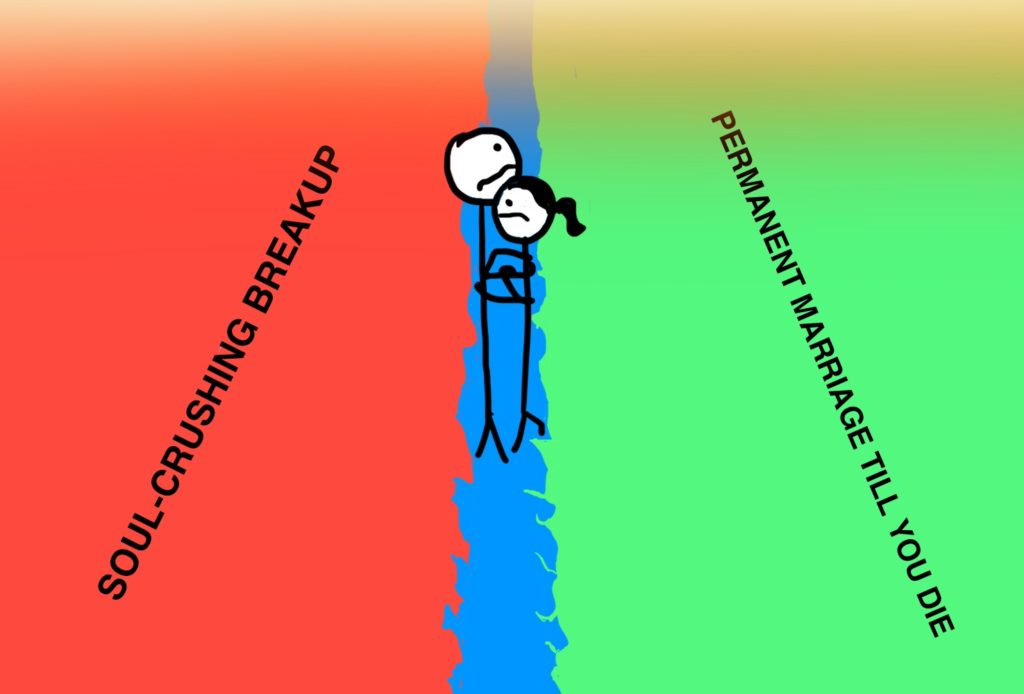A crisis in the relationship is usually a very difficult time; on the other hand, not all crises end.
When it comes to a couple who have been through several crises, it can be difficult to know if they are going through a moment of uncertainty/confrontation again or if they are permanently broken and only ashes remain.
- Thus.
- There are different types of crises in the relationship and also different types of endings.
- The main difference between a crisis and an end is that the latter is a specific point.
- But before we continue.
- Let’s finish the definition.
When we talk about crises in the relationship we are referring to a situation of high tension, in which there is often a temporary detachment. When we talk about the end, we are faced with a situation of separation in which people break the bonds that bind them together.
Thus, there are differences between the two situations. The problem is that sometimes differences only materialize when time passes and changes become more visible one way or another.
On the other hand, not knowing whether or not a crisis will end up creating potentially agonizing/agonizing uncertainty, so in this article we will talk about how to know if you are in crisis in the relationship or in a final. Break.
Problems are often the most common triggers of the crisis. Seizures can also occur after infidelity, the birth of a child, or a significant loss. All these reasons lead to different crises, which can be more or less long.
Among the most complicated crises to overcome are those that began or materialized after infidelity, in fact, with it what usually happens is the loss of trust and complicity with the other, the victim feels disappointed, betrayed, and it is also easy to get lost. -estimation and willingness to control the other power become obsessive.
On the other hand, the crises that arise as a result of the evolution of the relationship are the ones that can be solved more easily, are less difficult to overcome, for example, we are talking about crises that occur simply by the passage of time and natural changes in the relationship: such as the beginning of common life or the birth of a child , in these cases the link and union are not attacked.
Seizures can occur due to infidelity, the birth of a child, a serious family problem, or constant cohabitation problems.
The story and history of the couple say a lot about the crisis or the end of the situation, in the case of a couple who have already been through many crises, the relationship can be so stressed that it can lead to a permanent rupture.
Contrary to what is generally believed and thought that “this is one more crisis”, when there is already a history of separations or temporary terminations, there is a rupture that produces the feeling that the couple lives in a kind of eternal return to life. suffering.
That is, repeated seizures create an acquired impotence, and this can lead to a definitive ending, because one of the partners may begin to think that “there is no longer a solution”.
The reason for the separation is also an important aspect. Crises arising from infidelity tend to end: betrayal is devastating for the couple’s trust and for planning a future together.
Infidelity leads to a crisis in the relationship that, if not properly managed and at the right time, can lead to a definitive end and the ability to forgive and rebuild can be exhausted.
Moreover, if the reasons for the crisis are problems of coexistence or household chores, it is more likely not to stop; However, if we face a crisis due to problems of coexistence, we can also be faced with a situation of great emotional exhaustion that can, yes, lead to separation.
The reason for the separation is also an important aspect. Conditions arising from infidelities are generally final.
Especially when a couple shows important signs of incompatibility, they may think they face a definitive ending.
In this case, we mean the “four horsemen of the apocalypse” described by Dr. John Gottman after years of research on relationships. These four signs are usually closely associated with definitive separations. We’ll explain them below.
The four most important signs that indicate an end are: destructive criticism (both to make it and to receive it), defensive attitude, contempt for others and evasive attitude.
Thus, the presence of one of these attitudes or patterns of communication in the relationship informs us that we are going through a delicate moment; so that he can, yes, finish.

